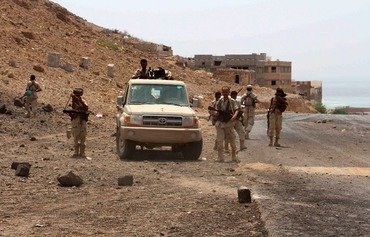After suffering a series of defeats in southern Yemen, al-Qaeda has carried out several attacks against the Hadramaut elite forces in what amounts to a desperate show of force, officials and experts tell Al-Mashareq.
On March 3rd, al-Qaeda elements attacked a security belt checkpoint in Hadramaut province's Khailat Bugshan, killing four soldiers and wounding one.
In a statement following the incident, the 2nd Military Zone command in Hadramaut described the attack as a reaction to the painful blows the elite forces had inflicted on the group.
In a subsequent attack, on March 15th, al-Qaeda gunmen fired rocket-propelled grenades (RPGs) at a security headquarters in al-Dliaah district of Hadramaut, wounding two soldiers, before fleeing the area.
"The two al-Qaeda attacks were actually carried out by scattered sleeper cells," Hadramaut deputy governor Abd al-Hadi al-Tamimi told Al-Mashareq.
Both were "gang-style" attacks in which there was no direct confrontation with the security forces, he said.
"The security circumstances put the Hadramaut elite forces front and centre and in al-Qaeda’s crosshairs in retaliation for their successes against al-Qaeda in Hadramaut ," al-Tamimi said.
The elite forces "liberated the city of al-Mukalla with backing from coalition forces and also took charge of security and pursuing al-Qaeda cells, which has led to the decline of the group", he added.
The security situation in coastal Hadramaut is better than it is in Hadramaut valley, al-Tamimi said, owing to the elite forces taking charge.
New security plan in Seiyun
"The local authority in Hadramaut valley has started implementing a new security plan in the city of Seiyun," he said.
This involves training former police officers and will subsequently be implemented in other Hadramaut valley districts, he said.
"These activities have not been publicised to prevent those personnel from being targeted," he said.
"The local authority is working to get security forces operational, because rebuilding state institutions requires strong security agencies of various specialisations," including counter-terrorism and riot control, he said.
The elite forces currently in charge of security will be merged into the national army when the war ends, he added, noting that rebuilding the security forces to complement the role of the army will enhance stability.
It is clear that al-Qaeda has been targeting the Hadramaut elite forces "in an open war between the two sides", said media activist Fawzia Ben Breik.
Al-Qaeda is targeting the elite forces because they succeeded in ousting the group from al-Mukalla after it had controlled the city for over a year, she told Al-Mashareq.
Al-Qaeda setbacks
"Al-Qaeda is no longer strong due to the blows it was dealt in the southern provinces of Hadramaut, Shabwa, Abyan and elsewhere," Ben Breik said, adding that al-Qaeda's recent attacks were carried out by "hit and run" gangs.
The elite forces have been charting successes against al-Qaeda, she said, calling on them "to expand their presence to all Hadramaut valley districts and attack al-Qaeda cells outside the areas under its security control".
Expanding the area of operation into all of Hadramaut valley is critical to eradicating al-Qaeda and establishing security and stability in the province, she said.
With the two recent attacks in Hadramaut province, al-Qaeda sought to send a message that it is still capable of carrying out attacks despite the successive military blows it has suffered, said political affairs researcher Adnan al-Humairi.
The group is "on its last breath" as a result of its losses in Hadramaut, Abyan, Shabwa and al-Bayda provinces, which include the loss of many of its commanders, he told Al-Mashareq.
Al-Qaeda recently suffered several military and financial setbacks that forced it to withdraw rather than engage in direct confrontation in many areas it used to be able to control, such as Loder in Abyan and Azzan in Shabwa, he said.

![Yemeni forces patrol near a crater in the road in the Abyan provincial capital of Zinjibar on August 16th, following an offensive to recapture the city from al-Qaeda. [Saleh al-Obeidi/AFP]](/cnmi_am/images/2017/03/24/7512-Yemen-Abyan-Zinjibar-600_384.jpg)







This isn’t al-Qaeda; al-Qaeda has no presence in Yemen. It’s the Jewish, Arabised Emirati organisation! Just understand, o, folk!
Reply1 Comment(s)